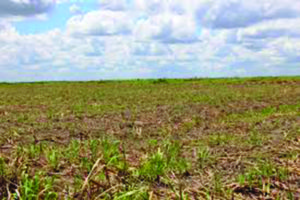– but closure of Skeldon Energy Inc., other factors lower projections
The 2017 Mid-Year Report presented to the National Assembly by Finance Minister Winston Jordan has revealed that the Guyana Sugar Corporation (GuySuCo) has a metaphorically long and winding road ahead of it.
In particular, it can expect a decrease in revenue because of two principal reasons, being (1): the Skeldon Energy Inc (SEI) was inoperable during the first crop of 2017; and (2): the sugar production target was reduced because of inclement weather, strike action from sugar workers, and factory maintenance downtime.

Nevertheless, a projected shoring up of its revenues is expected to come from a boost in the sale of land.
This report notes that, at the end of the first half of 2017, GuySuCo continued to record an operating deficit of some G$6.3 billion, described in the report as “symptomatic of the corporation’s inability to adjust its operations to the changing times”.
“The G$7 billion outlay to GuySuCo by Central Government by the end of the first half (of this year) is a reflection of the corporation’s continued inability to reform its cost structure and improve its competitiveness,” the report stated.
A revised revenue forecast of G$27.1billion was provided for 2017, down from the budgeted G$28.9 billion. But it is a pyrrhic consolation, as expenditure has been forecasted to rise to G$35.7billion, putting GuySuCo’s deficit at G$8.6 billion.
“The industry continues to be plagued by many problems, including an increase in the prices of several inputs, such as fertilizers; and these have had a negative impact on the company’s ability to realise sufficient cash to cover its operating costs”, the Report disclosed. “The sugar industry employs over 13,000 (persons), or over 75 per cent of the total employment amongst the PEs. At the half year, GuySuCo’s employment cost was an alarming 111.5 per cent of revenue,” the report noted.
Financial woes
GuySuCo had, in 2016, advertised for sale several acres of land, including vacant properties at Ogle, East Coast Demerara (ECD), where its headquarters are situated. In its tender, GuySuCo said it was looking to sell portions of its transported freehold lands situated at Mandela Avenue, Georgetown; Liliendaal; and Ogle, East Coast Demerara (ECD).
GuySuCo had, in 2015, sold to the Central Housing and Planning Authority (CH&PA) some 3000 acres of cane lands between Sophia and Ogle. Government previously communicated its intention to use acres of land owned by GuySuCo for housing projects and other developments. According to reports in sections of the media, GuySuCo used part of the money it received to pay its debt to the National Insurance Scheme (NIS).
However, GuySuCo’s state of indebtedness is much greater. When the board of directors and the management of GuySuCo appeared before the Parliamentary Sectoral Committee on Economic Services (PSCES) in January 2017, it was highlighted that GuySuCo was indebted to the tune of more than G$75 billion.
GuySuCo’s financial misfortunes have been exacerbated by the loss of one of its major export markets for sugar. For years, the African Caribbean and Pacific (ACP) Group of States had provided sugar to Europe on a quota system. In fact, more than 150,000 tonnes of sugar exported from Guyana used to go to the European Union (EU). But the EU quota management for sugar will officially end on September 30, 2017. Its loss is expected to lead to a dramatic fall in the international price for sugar, and a decrease in sugar imports from the ACP, with particular impact on Caribbean producers.
Government has been downsizing the sugar industry in a move fiercely resisted by the Guyana Agricultural and General Workers Union (GAWU). Last year, the operations of the LBI Estate were amalgamated with those of the Enmore Estate in order to make both estates more efficient, according to GuySuCo.
GAWU has noted that thousands of persons stand to be affected by the closure of the East Demerara Estate (Enmore), which employs some 2,200 persons spread across its field, factory, security, administrative and managerial departments.
Government also plans to privatize the Skeldon Estate and close down the Rose Hall and Enmore estates, according to well-placed sources. President David Granger has already announced that Government intends to keep functioning only the Blairmont, Uitvlugt and Albion estates.
Finance Minister Winston Jordan, in his presentation of the 2017 Budget, had indicated that the status quo obtaining in the sugar industry can neither be sustained nor maintained. According to him, as currently structured, the industry would require Government’s support to the tune of G$18.6 billion and G$21.4 billion for the years 2017 and 2018 respectively. He had explained that, based on the CoI, it was concluded that any money injected into sugar in its current state is money wasted.



